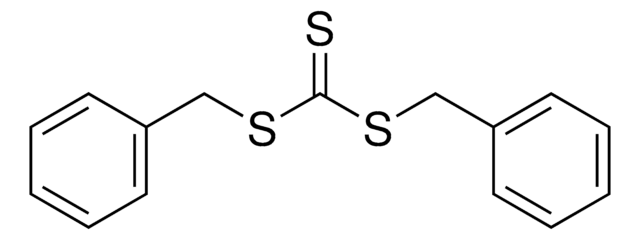760110
4-Cyano-4-[(dodecylsulfanylthiocarbonyl)sulfanyl]pentanol
Synonym(s):
Dodecyl Thiol Cyano Thiol
About This Item
Recommended Products
Assay
≥96.5% (HPLC)
Quality Level
form
solid or liquid (Powder or Solid or Crystals or Chunk(s) or Semi-solid or Liquid)
storage temp.
2-8°C
SMILES string
CCCCCCCCCCCCSC(=S)SC(C)(CCCO)C#N
InChI
1S/C19H35NOS3/c1-3-4-5-6-7-8-9-10-11-12-16-23-18(22)24-19(2,17-20)14-13-15-21/h21H,3-16H2,1-2H3
InChI key
SAFBIHFUHZPVOZ-UHFFFAOYSA-N
General description
Application
Features and Benefits
Signal Word
Danger
Hazard Statements
Precautionary Statements
Hazard Classifications
Acute Tox. 3 Oral
Storage Class Code
6.1C - Combustible acute toxic Cat.3 / toxic compounds or compounds which causing chronic effects
WGK
WGK 3
Flash Point(F)
No data available
Flash Point(C)
No data available
Choose from one of the most recent versions:
Already Own This Product?
Find documentation for the products that you have recently purchased in the Document Library.
Customers Also Viewed
Articles
The modification of biomacromolecules, such as peptides and proteins, through the attachment of synthetic polymers has led to a new family of highly advanced biomaterials with enhanced properties.
We presents an article about a micro review of reversible addition/fragmentation chain transfer (RAFT) polymerization. RAFT (Reversible Addition/Fragmentation Chain Transfer) polymerization is a reversible deactivation radical polymerization (RDRP) and one of the more versatile methods for providing living characteristics to radical polymerization.
Tools for Performing ATRP
Applying ARGET ATRP to the Growth of Polymer Brush Thin Films by Surface-initiated Polymerization
Protocols
We presents an article featuring procedures that describe polymerization of methyl methacrylate and vinyl acetate homopolymers and a block copolymer as performed by researchers at CSIRO.
We present an article about RAFT, or Reversible Addition/Fragmentation Chain Transfer, which is a form of living radical polymerization.
An article about the typical procedures for polymerizing via ATRP, which demonstrates that in the following two procedures describe two ATRP polymerization reactions as performed by Prof. Dave Hadddleton′s research group at the University of Warwick.
Our team of scientists has experience in all areas of research including Life Science, Material Science, Chemical Synthesis, Chromatography, Analytical and many others.
Contact Technical Service![4-Cyano-4-[(dodecylsulfanylthiocarbonyl)sulfanyl]pentanoic acid 97% (HPLC)](/deepweb/assets/sigmaaldrich/product/structures/204/925/30ae6ca0-5b0b-4963-a061-7e5e3d1a85af/640/30ae6ca0-5b0b-4963-a061-7e5e3d1a85af.png)
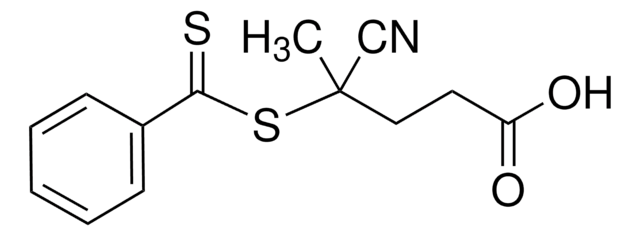




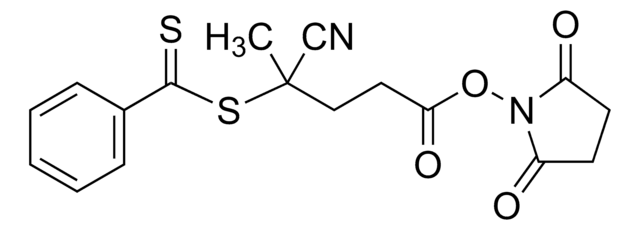
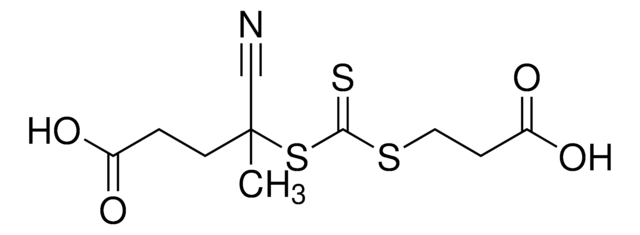
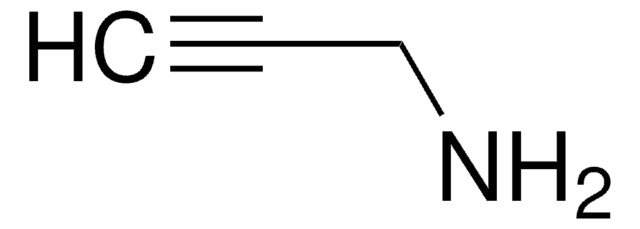
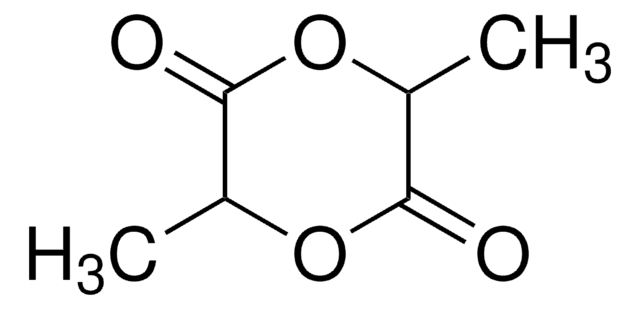

![Poly(ethylene glycol) methyl ether 4-cyano-4-[(dodecylsulfanylthiocarbonyl)sulfanyl]pentanoate average Mn 10,000](/deepweb/assets/sigmaaldrich/product/structures/618/250/98532519-ae4b-4fc4-b6f0-fb15f144c8f1/640/98532519-ae4b-4fc4-b6f0-fb15f144c8f1.png)
![2-[[(2-Carboxyethyl)sulfanylthiocarbonyl]-sulfanyl]propanoic acid](/deepweb/assets/sigmaaldrich/product/structures/427/606/b02310e2-102e-4324-b09d-e4c0de4fab2c/640/b02310e2-102e-4324-b09d-e4c0de4fab2c.png)
![Pentaerythritol tetrakis[2-(dodecylthiocarbonothioylthio)-2-methylpropionate] 97% (HPLC)](/deepweb/assets/sigmaaldrich/product/structures/234/301/a6e20d26-df1b-49c6-bdee-c98dd3488cc2/640/a6e20d26-df1b-49c6-bdee-c98dd3488cc2.png)
